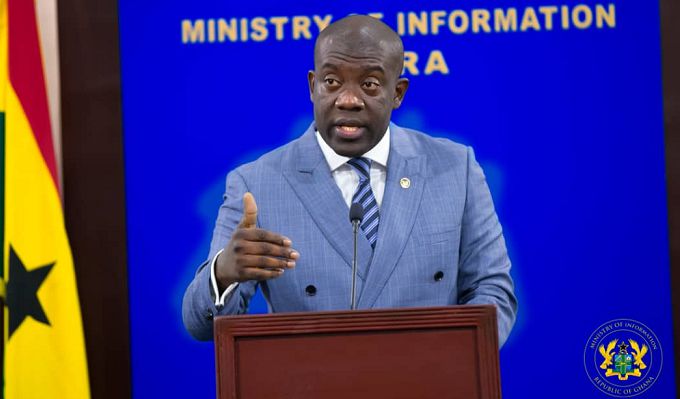Information Minister, Kojo Oppong Nkrumah says government will seek to negotiate a programme with the International Monetary Fund (IMF) that will support economic growth and protect jobs in various sectors of economy.
Speaking on Citi FM’s breakfast show, Mr. Oppong-Nkrumah said the first part of the engagements with the IMF is to look at that data to determine which kind of program will work for the country.
“As we know, the IMF has several programmes. So, as they are coming to town from about Wednesday, what we’re going to do is to share all the data and then come to sit and understand if it is an ECF [extended credit facility] we are going for, or a standby facility.
I think if the evidence of the recent past is anything to go by, we are minded to negotiate in a manner that seeks to protect what is in the best interest of the Ghanaian people. The programme that will ensure that people get jobs, people get incomes, they can improve their quality of life as much as possible, they can get relief from the pressures that Russia Ukraine, COVID and the challenges to our domestic program are imposing on us – that is the framework and the mindset with which we are going into these negotiations,” he said.
He further stated that government is aiming for more rapid completion of the negotiations with the IMF.
“We are hoping we can do it a bit faster, probably, but we need to sit with them from Wednesday and have that conversation. Typically, it takes about six months to nine months to agree on a program. Then, you have the prior actions that you have to follow. The last one took seven months to negotiate. Averagely, is usually about six months,” he said.
Challenges
Government is faced with the daunting challenge of ballooning public debt, which is about 80 percent of gross domestic product (GDP); unprecedented interest costs, with interest payments ranging about GH¢ 10.6 billion, equivalent to 82.4 percent of tax revenue as of the end of the first quarter of 2022, amid rising cost of financing its budget in face of incessant consumer inflation, which currently is at 27.6 percent.
The country’s dwarfed revenue performance stood at GH¢16.62 billion in Q1 2022 less than the target of GH¢19.18 billion; amid high government expenditure of GH¢26.95 billion in the same period.
The economy, currently, is under a spell of low credit rating from all international rating agencies. Standard & Poor’s credit rating for Ghana stands at B- with a stable outlook. Moody’s credit rating for Ghana was the last set at Caa1 with a stable outlook. Fitch’s credit rating for Ghana was last reported at B- with a negative outlook.
In general, a credit rating is used by sovereign wealth funds, pension funds and other investors to gauge the credit worthiness of Ghana thus having a big impact on the country’s borrowing costs.
Alongside, the balance of payments position of the country has worsened. Some significant outflows from net portfolio reversals and net private capital outflows, resulted in an overall balance of payments deficit of US$934.46 million for the first quarter of 2022, compared with a deficit of US$429.93 million, the same time last year, according to the central bank’s summary of macroeconomic and financial data.










